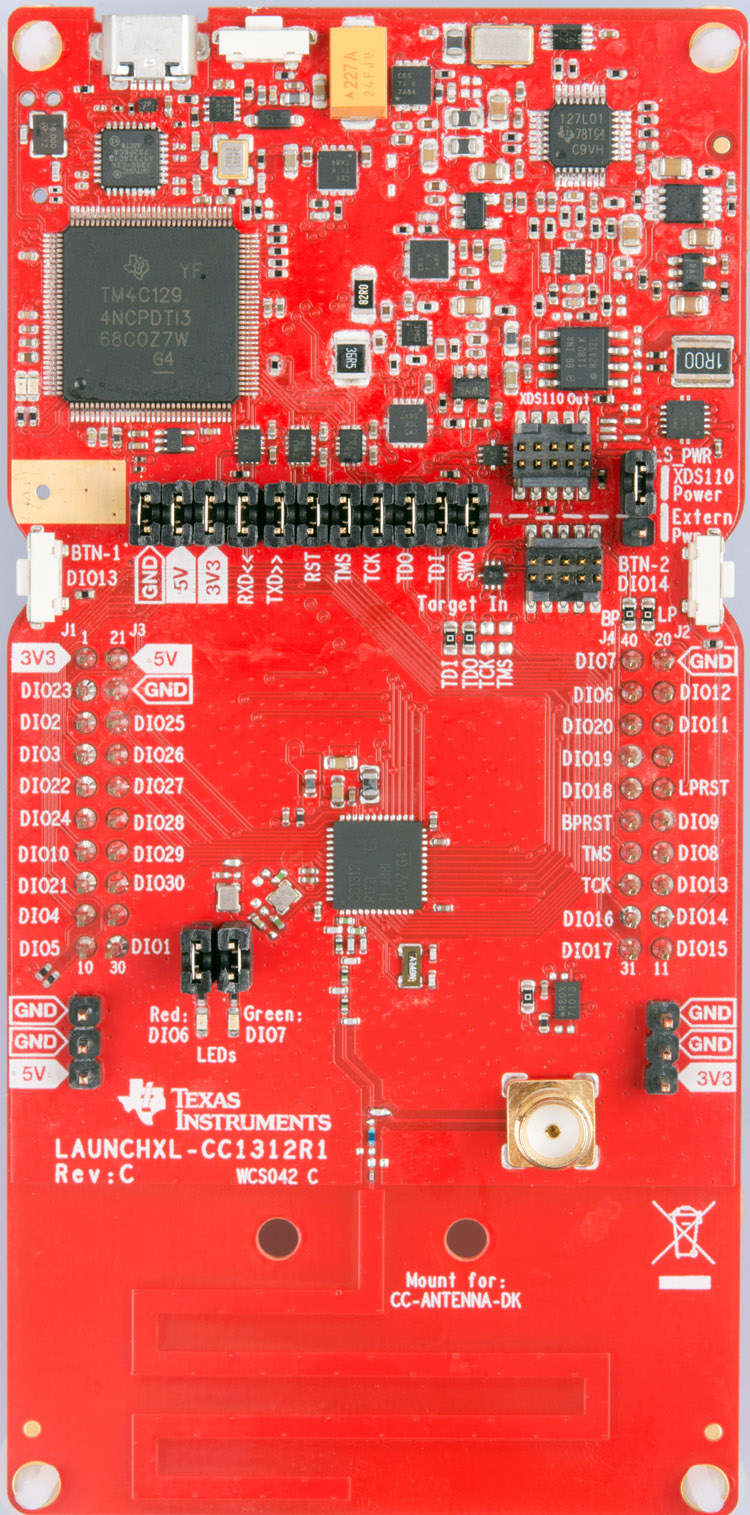Texas Instruments SimpleLink(TM) CC1312 Wireless MCU LaunchPad(TM) Kit. More...
Detailed Description
Texas Instruments SimpleLink(TM) CC1312 Wireless MCU LaunchPad(TM) Kit.
Overview
The LAUNCHXL-CC1312R1 is a Texas Instrument's development kit for the CC1312R1 SoC MCU which combines a Cortex-M4F microcontroller alongside a dedicated Cortex-M0 to control radio.
Hardware

| MCU | CC1312R1 |
|---|---|
| Family | ARM Cortex-M4F |
| Vendor | Texas Instruments |
| RAM | 80KiB |
| Flash | 352KiB |
| Frequency | 48MHz |
| FPU | yes |
| Timers | 4 |
| ADCs | 1x 12-bit (channels) |
| UARTs | 2 |
| SPIs | 2 |
| I2Cs | 1 |
| Vcc | 1.8V - 3.8V |
| Datasheet | Datasheet (pdf file) |
| Reference Manual | Reference Manual |
Board pinout
The CC1312R Quick Start Guide provides the default pinout for the board.
Flashing and Debugging
The LAUNCHXL-CC1312R1 comes with an XDS110 on-board debug probe that provides programming, flashing and debugging capabilities.
Using TI tools
Installing CCS and Uniflash
The TI's Code Composer Studio provides the necessary tools to use the debug features of the XDS110; Uniflash provides flashing tools. Both programs can be found here:
- Code Composer Studio (CCS) Integrated Development Environment (IDE).
- Uniflash Standalone Flash Tool for TI Microcontrollers (MCU), Sitara Processors & SimpleLink devices.
Before using the XDS110 with the latest CCS/Uniflash versions the firmware for it needs to be updated. Texas Instruments has a guide to correctly update it here.
Setting up the environment
In order to make use of the programming and debugging capabilities of the XDS110 some environment variable needs to be set:
That assumes you have CCS 9.3.0 (for the path name) and Uniflash 5.2.0, adjust accordingly.
After that you can flash using the RIOT make flash command on your application or to debug you first start the debug server:
And then on another terminal you can run:
It will open GDB and connect to the debug server automatically.
Reset
The LAUNCHXL-CC1312R1 provides a reset button but it can also be reset from a computer using the make reset command.
Using OpenOCD
To use OpenOCD with the XDS110 you need to use the an special version of OpenOCD made by TI (upstream version is not yet compatible). You can clone and compile it from source:
Setting up the environment
Now that we have the TI version of OpenOCD we need to export the PROGRAMMER environment variable, this is to enable OpenOCD instead of Uniflash.
Now we can just do make debug-server and then make debug, this all using OpenOCD.
Files | |
| file | periph_conf.h |
| Peripheral MCU configuration for TI CC1312 LaunchPad. | |
